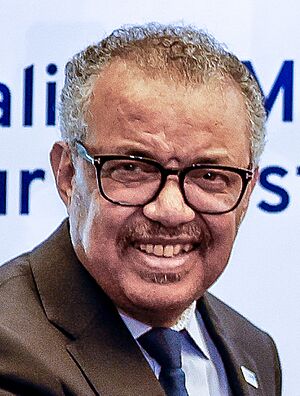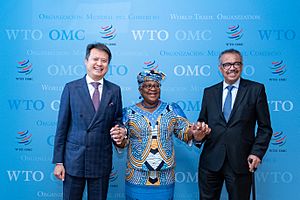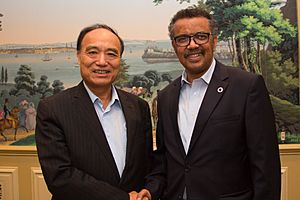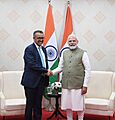Tedros Adhanom Ghebreyesus facts for kids
Quick facts for kids
Tedros Adhanom Ghebreyesus
HonFRS
|
|
|---|---|
|
ቴዎድሮስ አድሓኖም ገብረኢየሱስ
|
|

Tedros in 2024
|
|
| 8th Director-General of the World Health Organization | |
| Assumed office 1 July 2017 |
|
| Deputy | Zsuzsanna Jakab Michael Ryan |
| Preceded by | Margaret Chan |
| Minister of Foreign Affairs | |
| In office 29 November 2012 – 1 November 2016 |
|
| Prime Minister | Hailemariam Desalegn |
| Preceded by | Berhane Gebre-Christos (acting) |
| Succeeded by | Workneh Gebeyehu |
| Minister of Health | |
| In office 12 October 2005 – 29 November 2012 |
|
| Prime Minister | Meles Zenawi Hailemariam Desalegn |
| Preceded by | Kebede Tadesse |
| Succeeded by | Kesetebirhan Admasu |
| Personal details | |
| Born | 3 March 1965 Asmara, Ethiopia (present-day Eritrea) |
| Political party | Tigray People's Liberation Front |
| Children | 5 |
| Education |
University of Asmara (BS)
London School of Hygiene & Tropical Medicine (MS) University of Nottingham (PhD) |
| Signature |  |
| Scientific career | |
| Fields | Community health |
| Thesis | The effects of dams on malaria transmission in Tigray Region, northern Ethiopia, and appropriate control measures (2000) |
Tedros Adhanom Ghebreyesus (born March 3, 1965) is a public health leader from Ethiopia. Since 2017, he has been the Director-General of the World Health Organization (WHO). He is the first person from Africa to hold this important job.
As the head of the WHO, Tedros has led the global response to major health crises. These include the Ebola virus epidemic, the COVID-19 pandemic, and the 2022–2023 mpox outbreak. Before joining the WHO, he served in Ethiopia's government as the Minister of Health and later as the Minister of Foreign Affairs. In 2020, Time magazine named him one of the 100 most influential people in the world.
Contents
Early Life and Education
Tedros was born in Asmara, which is now the capital of Eritrea but was part of Ethiopia at the time. His family was from the Tigray region of Ethiopia. When he was a child, he saw how much people suffered from diseases like malaria.
A personal tragedy also shaped his life. His younger brother died at age three or four from a disease that could have been prevented, possibly measles. Tedros often says this experience made him determined to improve healthcare for everyone.
In 1986, Tedros earned a degree in biology from the University of Asmara. He later studied in the United Kingdom. He received a Master of Science degree from the University of London in 1992. In 2000, he earned a PhD in community health from the University of Nottingham. His research focused on how dams affect the spread of malaria.
Career in Ethiopia
After getting his first degree in 1986, Tedros began working for Ethiopia's Ministry of Health. By 2001, he was the head of the health department in the Tigray region.
Minister of Health (2005–2012)
In 2005, Tedros became Ethiopia's Minister of Health. At the time, the country's health system faced many problems, including poverty and a lack of doctors and hospitals.
Tedros created a plan to improve healthcare across the country. His work included:
- Building 4,000 new health centers.
- Training and hiring over 30,000 health extension workers. These workers brought basic healthcare to communities.
- Focusing on major diseases like HIV/AIDS, tuberculosis, and malaria.
These efforts led to big improvements. For example, between 2006 and 2011, the number of babies who died before their first birthday fell significantly.
During his time as minister, Tedros worked with global leaders and organizations. He partnered with former U.S. President Bill Clinton and the Bill & Melinda Gates Foundation to bring more resources to Ethiopia's health system.
Minister of Foreign Affairs (2012–2016)
In 2012, Tedros was appointed Ethiopia's Minister of Foreign Affairs. In this role, he represented his country on the world stage.
One of his key achievements was helping to organize a major conference in Addis Ababa in 2015. At this meeting, countries from around the world agreed on a plan to fund the Sustainable Development Goals. These goals aim to end poverty and protect the planet.
Tedros also played a leading role in the African Union's response to the Ebola epidemic in West Africa from 2013 to 2016. He encouraged African countries to work together and sent 200 trained health workers from Ethiopia to help.
Director-General of the World Health Organization
In 2017, Tedros was elected Director-General of the WHO. He became the first African to lead the organization. He was elected with a large majority of votes from member countries.
First Term (2017–2022)
As Director-General, Tedros made universal health coverage his top priority. This means he believes everyone should have access to good healthcare without facing financial hardship.
Handling Health Crises
Tedros has managed the WHO's response to several global health emergencies. He traveled to the Democratic Republic of Congo during the Kivu Ebola epidemic to support the response on the ground.
COVID-19 Pandemic
His biggest challenge came in early 2020 with the start of the COVID-19 pandemic. Tedros and the WHO worked to track the virus and advise countries on how to respond.
- January 2020: Tedros met with leaders in China, where the virus first appeared. The WHO declared the outbreak an emergency in China but not yet a global one.
- March 2020: As the virus spread worldwide, the WHO officially declared COVID-19 a pandemic. Tedros called it "the defining global health crisis of our time."
- Global Response: He urged countries to test for the virus, protect health workers, and work together. He praised China's early efforts to control the virus.
Some leaders, including U.S. President Donald Trump, criticized Tedros. They said the WHO acted too slowly and was too close to China. However, many African leaders praised his leadership during the crisis.
Controversies
During his career, Tedros has faced some controversies.
- Mugabe Appointment: In 2017, he named Zimbabwe's President Robert Mugabe a "Goodwill Ambassador." This caused a public outcry because of Mugabe's poor human rights record and the collapse of Zimbabwe's health system. Tedros quickly withdrew the appointment.
- Tigray Conflict: During the conflict in Ethiopia's Tigray region, some Ethiopian officials accused Tedros of supporting the Tigray forces. Tedros, who is from Tigray, denied these claims. He has spoken out against the blockade of the region, calling it "an insult to our humanity."
Second Term (2022–Present)

In May 2022, Tedros was re-elected for a second five-year term as Director-General.
He has continued to speak out on global health issues. He has called attention to the humanitarian crises in places like Ukraine, Sudan, and Afghanistan.
During the Gaza war that began in 2023, Tedros condemned attacks on civilians and called for the protection of hospitals and health workers. He described the conditions in Gaza as "hellish" and urged for a peaceful solution.
Personal Life
Tedros is married and has five children.
Images for kids
-
Tedros with Azerbaijan's President Ilham Aliyev in July 2018
-
Tedros with Georgian President Salome Zourabichvili in September 2019
-
Tedros with Finnish Prime Minister Sanna Marin in October 2021 during the COVID-19 pandemic
-
Tedros with Indian Prime Minister Narendra Modi in April 2022
Selected works and publications
Journals
![]() Wikidata ()
Wikidata () ![]() Wikidata ()
Wikidata ()
- Ghebreyesus, Tedros Adhanom (2000). The effects of dams on malaria transmission in Tigray Region, northern Ethiopia, and appropriate control measures (PhD thesis). University of Nottingham. OCLC 557465936. EThOS uk.bl.ethos.312201. https://discover.libraryhub.jisc.ac.uk/search?q=Ghebreyesus%2C%20Tedros%20Adhanom&rn=1.
![]() Wikidata ()
Wikidata () ![]() Wikidata ()
Wikidata ()
![]() Wikidata ()
Wikidata () ![]() Wikidata ()
Wikidata () ![]() Wikidata ()
Wikidata () ![]() Wikidata ()
Wikidata ()
![]() Wikidata ()
Wikidata ()
See also
 In Spanish: Tedros Adhanom para niños
In Spanish: Tedros Adhanom para niños
 | Calvin Brent |
 | Walter T. Bailey |
 | Martha Cassell Thompson |
 | Alberta Jeannette Cassell |






